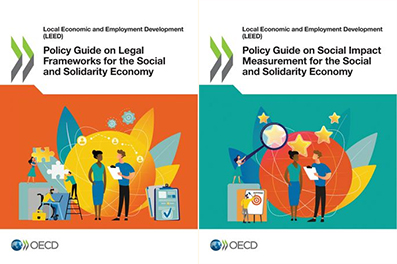The OECD published at the end of March two new guides in the framework of its Global Action “Promoting Social and Solidarity Economy Ecosystems”. The Action has focused on two critical policy levers that can help unlock the potential of the social and solidarity economy, namely legal frameworks and social impact measurement, in addition to other drivers of a strong policy ecosystem.
The Policy Guide on Legal Frameworks for the Social and Solidarity Economy aims to support countries, regions and cities wishing to use legal frameworks as an appropriate lever to develop conducive social and solidarity economy (SSE) ecosystems. Building on data and information as well as good practice examples from over 33 countries, it provides step-by-step guidance, success factors and “pitfalls to avoid” to help policy makers i) assess why and when legal frameworks for the SSE are needed; ii) select legal options and involve stakeholders; iii) evaluate the performance of laws, and, iv) foster international peer learning on this topic.
The guide also capitalises on learnings from the scoping paper on Legal frameworks for the social and solidarity economy, prepared as part of the OECD Global Action “Promoting Social and Solidarity Economy Ecosystems”, funded by the European Union’s Foreign Partnership Instrument, and the Manual ‘Designing Legal Frameworks for Social Enterprises: Practical Guidance for Policy Makers’.
Moreover, as social and solidarity economy (SSE) entities are increasingly asked to demonstrate their positive contribution to society, social impact measurement can help them to understand the additional net value generated by their activities. To this end, the OECD has also published the ‘Policy Guide on Social Impact Measurement for the Social and Solidarity Economy’. Based on a mapping exercise and examples of good practice from more than 33 countries, this guide explains how policy makers can support social impact measurement for the social and solidarity economy. The new guide builds on the previous publication ‘Social Impact Measurement for the Social and Solidarity Economy’, published in 2021.
Working for over two decades on policies for the social and solidarity economy
The OECD has been working for over two decades on policies for the social and solidarity economy (SSE), including in collaboration with the European Union. In 2020, the OECD launched the Global Action “Promoting Social and Solidarity Economy Ecosystems”, to support its development and internationalisation.
The Action has brought together international peer learning partnerships, including experts of CIRIEC, to share good practices, produce international statistics, and take a deep dive on particular themes (e.g., internationalisation and social procurement) as well as particular groups (such as youth leading social enterprises, women and refugees).
Countries targeted by the Action include all EU member states and six non-EU countries (Brazil, Canada, India, Korea, Mexico, the United States).







